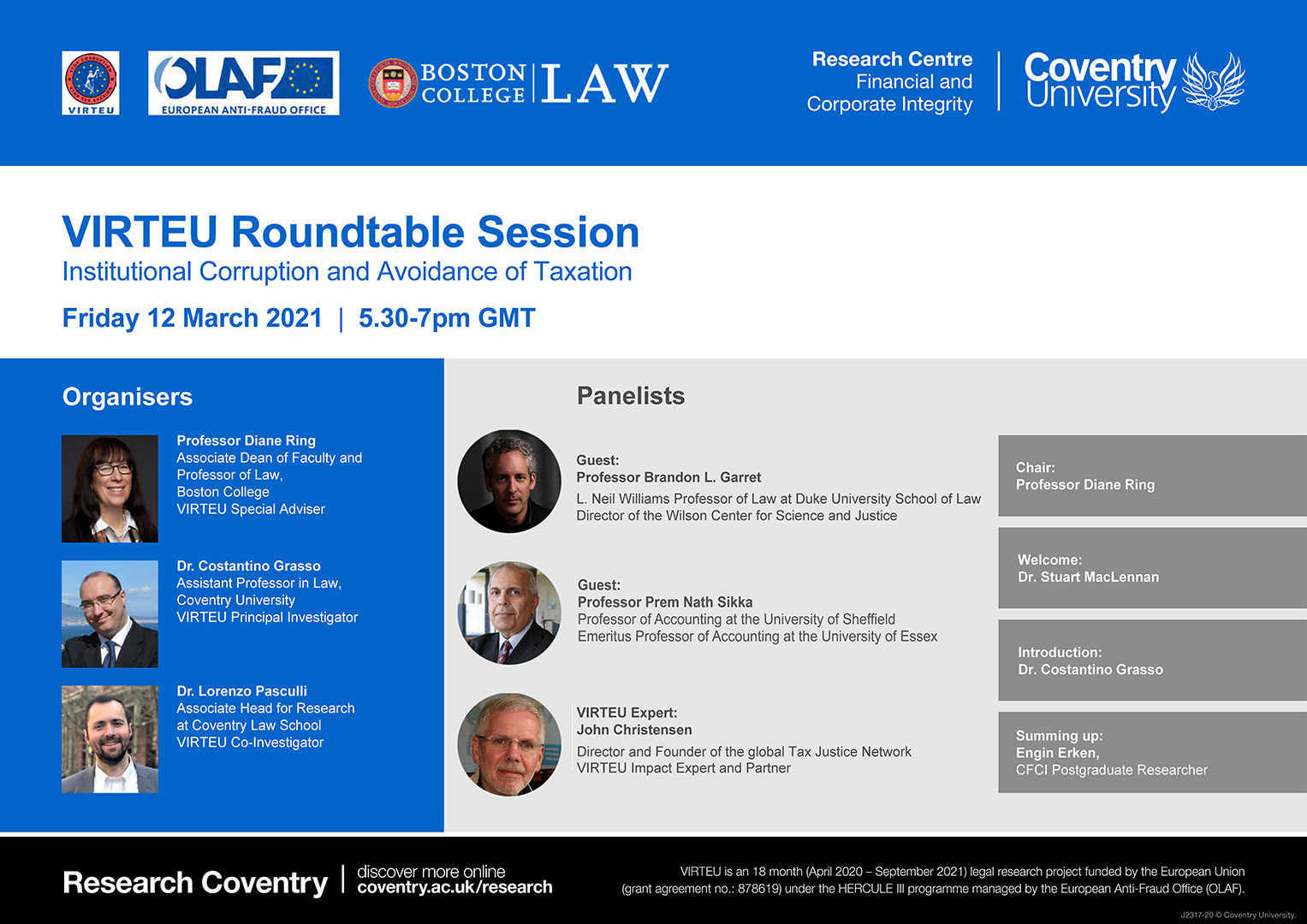|
Getting your Trinity Audio player ready...
|
*** On the 12th of March 2021, it was held the fourth session of the VIRTEU Roundtable Discussion Series, which focused on “Institutional Corruption and Avoidance of Taxation“. VIRTEU (Vat fraud: Interdisciplinary Research on Tax crimes in the European Union – Grant Agreement no: 878619) is a high profile legal research project funded by the European Union, which aims at exploring the interconnections between tax crimes and corruption to unravel the relationships between fraud and corrupt practices in the area of taxation.
The series has been organized by VIRTEU Special Adviser Prof. Diane Ring, who is Associate Dean of Faculty, Professor of Law and Dr. Thomas F. Carney Distinguished Scholar at Boston College Law School, the project Principal Investigator, Dr. Costantino Grasso, who is Assistant Professor of Law at Coventry University and Editor-in-Chief of this Blog, and the Co-Investigator, Dr. Lorenzo Pasculli, who is Associate Head for Research at Coventry Law School.
The session, which was chaired by Prof. Diane Ring, enjoyed the participation of Prof. Brandon L. Garret, who is L. Neil Williams Professor of Law at Duke University School of Law and Director of the Wilson Center for Science and Justice; Prof. Prem Nath Sikka, who is Member of the United Kingdom House of Lords and Emeritus Professor of Accounting at the University of Essex; and John Christensen, who is Director and Founder of the global Tax Justice Network and VIRTEU Impact Expert and Partner.
Video Recording
- Opening Remarks
- Topic 1: Inter-state corruption in the area of taxation
- Topic 2: Institutional corruption at the national level (lobbying and undue influence)
- Topic 3: Unnecessary complexity of tax regulations and auditing procedures
- Topic 4: Recommended steps to counter institutional corruption
- Question 1: The new UK Covert Human Intelligence Sources Bill and its potential abuses
- Question 2: Regulatory capture and Global North/Global South relationship
- Question 3: Exchange of favors and interdependence of members of the elite
- Question 4: Institutional corruption and public-private partnerships
- Summing Up
Summary of the Roundtable (by Engin Erken)
The Roundtable Session discussed different forms of corruption with a specific focus on structural-institutional issues that could be framed as (i) conflict-of-interest situations relating to the state-corporate nexus; (ii) lobbying practices in terms of undue corporate influence on the political process and tax regulation; and (iii) the enforcement aspect of the phenomenon regarding tax prosecutions of corporations and backroom deals.
In the opening remarks (1:33) the project Principal Investigator, Dr. Costantino Grasso, explained that, from the research activities conducted by the Core Research Team, it has clearly emerged that the intimate interconnections between tax crimes and corruption are not restricted to the phenomenon of bribery, which corresponds to “the corrupt payment, receipt or solicitation of a private favor for official action”, and that, although the scenarios where a bribe is paid by a tax debtor to a representative of the tax administration or tax police are surely relevant and deserve full attention, it appears that they represent only a fraction of the problem, and most likely not the most significant one.
In that regard, Dr. Grasso identifies three different dimensions that emerge as relevant. At the highest level (6:26), we could include the harmful tax practices adopted by national states competing against each other through preferential tax regimes or sweetheart deals. Turning our attention to the national level (6:59), the most relevant questions here seems to be how unethical lobbying practices and the role of corporate power in politics may distort the decision-making process in our democracies and, in particular, adversely affect the area of anti-tax evasion. Finally, corruption may adversely affect the national anti-tax evasion practices even where adequate regulations are present (9:05). These appear to be the more subtle, obscure, and underestimated effects of the interconnections between tax crimes and corrupt practices. Their consequences may consist of direct attempts to frustrate the enforcement of anti-tax evasion rules, for instance limiting the resources, independence, competencies, and powers of the enforcement authorities or agencies, or in backroom deals based on conflicts of interest generated by the economic and social interdependence of the members of the ruling elite, which are amplified and sustained through revolving door practices and asymmetric exchanges of favors.
A conflict of interest constitutes one of the drivers for corrupt practices. Lobbying, for example, as a matter of conflict of interest, has long been a crucial factor, amongst others, in the creation process of legal instruments, thereby accounting, at least in part, for the efficiency or inefficiency of a given legal system in tackling unlawful, sometimes lawful but unethical, conduct, including tax fraud/evasion and (aggressive) tax avoidance. Therefore, it is of utmost importance to evaluate how corruption affects the taxation modus operandi across the European Union (EU) and the globe. A closer look at the current state of affairs relating to the lobbying-taxation nexus reveals that lobbying serves as a mechanism where influential groups, such as Multinational Enterprises (MNEs) and Big Four Accounting Firms, play a dominant role in influencing tax laws and regulations to the detriment of the general public interest. For instance, there are legislators who are on the payroll of big corporations (25:04). Consequently, national tax policies are affected by the undue influence of and forceful pressure from wealthy corporations, resulting in a corrupt environment where profit shifting (27:20) and aggressive tax avoidance practices are allowed. In more concrete terms, the annual tax gap in the United States is approximately 400 hundred billion dollars (33:26), suggesting the magnitude of the predicament, albeit being at a jurisdiction-specific scale.
Yet, the undue corporate influence on the political process and tax legislation is not the only detrimental consequence of adverse lobbying practices. Such lobbying where corruption is in force and the associated national taxation approaches also bring along concerns about the (unfair) competition between states. A thorough examination of the connection between states and corporations unveils that the relationship between them is far from healthy, as such interactions predominantly occur in a corrupt environment. The unhealthy connection between states and corporations constitutes a systematic problem, as the authorities are ironically the same stakeholders who are part of and responsible for dealing with the difficulty. By way of explanation, as Professor Garret put forward, the states who operate tax-havens also protect them politically, thereby granting privileges to particular groups to bolster their economy ultimately. In reality, however, hosting an enormous privileged financial sector only benefits a tiny minority and does not benefit the economy as a whole. In the words of Mr. Christensen, the Director and Founder of the global Tax Justice Network (one of our Impact Partners), competitive advantage is completely ‘toxic nonsense’ (57:18) and is all about promoting competition between states. Therefore, the supply side of corrupt practices, such as tax-havens and enablers, are the key parties at the bottom of the ostensibly competitive disadvantages between jurisdictions.
The above-explained circumstances and anomalies render the enforcement of wrongdoings committed in this context an extremely arduous task for law enforcement agencies (LEAs). Amongst others, the complexity of tax legislation, the lack of skills and competencies of the relevant authorities, the unwillingness to prosecute big corporations, inadequate resources (1:00:41), and the absence of meaningful enforcement apparatuses result in ineffective tackling mechanisms. Legal entities, powerful corporations in particular (e.g., MNEs), always look for agreement opportunities to resolve legal disputes on tax matters. Furthermore, in cases where they agree on a settlement, rather than being transparent, it is in the form of backroom deals. These secretive bargains also involve revolving door relationships between various parties, such as auditors, accountants, and lawyers, to name a few, which further aggravates the situation at the expense of the public interest. In other words, the way in which regulatory bodies are structured, inter alia, plays a critical role in this context (47:20). For example, it would not be unreasonable to expect such major-league corporations to settle those arrangements with a minimum loss possible where they recruit former high-level prosecutors as their defenders.
As Professor Sikka aptly posited, transparency, accountability, integrity, and openness are crucial to safeguard the public interest, the reinforcement of which seems to be the best strategy for tackling the phenomenon efficiently (45:54). Given the paramount importance of these safety measures in ensuring a robust political and economic atmosphere, the notion of state secrecy is another salient matter to be considered in this context, as it may well impact taxation policies of a given jurisdiction. Professor Sikka explained the potentially pernicious effects of state secrecy regarding taxation exercises based on a recent bill of the UK government, namely the Covert Human Intelligence Sources Bill (CHIS) 2019, to which he refers as the ‘worst kind of legislation which anybody could ever develop’ (1:07:17). The Bill harnesses the British Intelligence Agencies, LEAs, and specific public authorities, including HMRC (i.e., the principal tax authority in the UK), with the legal power to grant individuals criminal immunity to participate in conduct that would otherwise constitute a criminal offence provided, amongst others, that such participation is in the interest of the economic well-being of the jurisdiction.[1] In other words, the enactment of the Act[2] may negatively affect the taxation domain as taking legal actions against corrupt tax practitioners, provided that they are authorised to do so, will be unfeasible due to the privileges it introduces. Lastly, private-public partnerships that have been an efficient strategy in combatting financial crimes, such as money laundering,[3] appear to be inadequate in tackling corruption and tax violations. More specifically, regarding corruption and tax offences, they are part of the problem rather than being part of the solution due, amongst others, to the lack of accountability (1:28:11). In a summary, it is a never-ending struggle to overcome, which requires, in essence, education and a revolution of the human consciousness to address the conundrum.
[1] Home Office, Covert Human Intelligence Sources Bill Factsheet (accessible version), accessed from https://www.gov.uk/government/publications/covert-human-intelligence-sources-draft-code-of-practice/covert-human-intelligence-sources-bill-factsheet-accessible-version.
[2] CHIS 2021 received royal assent on 01 March 2021. It can be accessed from https://www.legislation.gov.uk/ukpga/2021/4/introduction/enacted.
[3] For instance, Joint Money Laundering Intelligence Task Force (JMLIT), a partnership between the British LEAs and the finance sector, has secured more than 130 arrests and has denied over GBP 13m since its inception in 2015. It can be accessed from https://www.nationalcrimeagency.gov.uk/what-we-do/national-economic-crime-centre.


